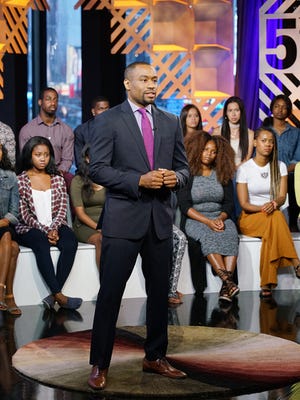BET presents '5 Things' viewers can do to stop police brutality

In the wake of increasing visibility on police misconduct, BET is looking at 5 Things You Can Do to Change S***.
The one-hour special, which airs on BET Wednesday (8 p.m. ET) and on CENTRIC Thursday (11 p.m. ET), will examine how to leverage social media, community resources, social justice organizations and voting to fight systemic violence.
Ahead of the program, we talked with BET News correspondent Marc Lamont Hill, the host for the special and author of Nobody: Casualties of America’s War on the Vulnerable, from Ferguson to Flint and Beyond.
Q: Last month, BET teamed up with MTV to host a town hall on police brutality. How will 5 Things further that conversation?
A: The first town hall was an opportunity for us to hear what the community was saying. But too often, television networks leave the conversation there. The easy part is to talk about what’s frustrating people… but we wanted to help solve the problem, to come up with something that was concrete, actionable and manageable.
Q: There will be some viewers who will reflexively dismiss this special because they think it's suggesting the onus is on the vulnerable to prevent systemic violence...
A: Throughout the program, we reiterate that it’s not on black people to stop police brutality and the steps we take aren't informed by respectability politics. It’s not like, "Pull your pants up and they won’t stop you." It’s, "Get a community-controlled review board so when they do stop you illegally and when there is a bad shooting, you’re able to hold the police accountable." Vote — so that you can be on the jury (and) then you can make the right decision when a Trayvon Martin-George Zimmerman crisis happens. And when you do go to the voting booth, pick people not just at the top of the ticket but at the bottom and middle of the ticket, people who can make your local life better.

Q: I want to turn the lens on you briefly. You grew up in Philly. What was local life there like in terms of policing?
A: My earliest memories of police were the police in Philadelphia being very aggressive. You know, they assaulted my father... so I grew up with an understanding of the police as an occupying force, not as community servants. And as I travel, I find that vulnerable people all over the world have a different relationship with law enforcement than privileged people do. It doesn’t matter whether I’m in France or Egypt or Los Angeles. People who grow up with privilege, they look to the police for help. You know, I have a good job, I make a decent income, I have a PhD and when I see the blue lights behind me, I still get scared.
Q: How do we fix that culture of fear and mistrust?
A: We have to change policy so that police are more invested in maintaining peace in neighborhoods than policing minor crimes. And we have to go into our psyches. It's not necessarily that officers have bad intentions or that they're racist. Studies show that police officers tend to look at black boys as older and more guilty then they are. So when they see a 12-year-old Tamir Rice with a toy, they do see a 20-year-old man with a gun. We have to change how people see black men and women, boys and girls. And as policies and attitudes change, then communities can have more faith in the police.
Lastly, we have to change some of the fundamental things that lead to crime environments because we can’t pretend crime doesn’t happen. People get shot in our neighborhoods and a lot of the shooters are black and most of the victims are black, so we can't pretend that that's not true. But what we have to do is get at the core issues that make that true. Some of that is conflict resolution. A lot of it is jobs, education, housing and healthcare.

Q:We've seen instances where having social media provide that counternarrative didn't work, where voting didn't seem to pan out in our favor. What's your response to people who look at the tips presented and say, "What if these fail us?"
A: There's never been a moment in history where citizen-controlled government, economic sanctions and voting have, combined with the tools of communication, you know, social media, failed. We may not be successful in a particular project ... and we'll continue to mold and change tactics but I am convinced that this is a strategy that gets us to win and that's why we're so committed to doing this special and other forms of programming — from documentaries to conversations to news specials to invoking the digital realm.
We're committed to using multiple platforms to address this problem and we believe that these strategies will help us get to where we want to be, which is a world that’s safer, more democratic and more just for everybody.